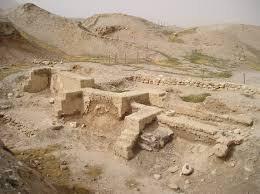
Jericho. By A. Sobkowski – Own work, Public Domain, https://commons.wikimedia.org/w/index.php?curid=2110423
Among Biblical scholars and archaeologists it is almost axiomatic that the Israelites entered Canaan about 1230–1220 B.C. In terms of archaeological periods, this would be towards the end of the Late Bronze Age, for which the Generally Accepted Date (GAD) is 1550–1200 B.C.
Yet there are enormous problems with this dating. In recent decades an increasing number of scholars have recognized that if we accept the GAD of 1230–1220 B.C. for the Israelite entry into Canaan, we must reject the Biblical account of Israel’s conquest of Canaanite cities. This is because the Biblical account conflicts so strongly with the archaeological record. The Bible describes the Israelite conquest of Canaan at length and refers to a number of cities encountered by Joshua and his armies. In almost every case the archaeological evidence is inconsistent with the Biblical evidence—if we date the Israelite entry into Canaan to the GAD of 1230–1220 B.C.
Jericho was the first city encountered by Joshua and the Israelites when they crossed the Jordan (Joshua 2 and 6). According to the Bible, the Israelites conquered and destroyed Jericho. But according to the archaeologists—and the site has been very extensively excavated—there was no city at Jericho in 1230–1220 B.C. for the Israelites to destroy.
Read the rest of Redating the Exodus in the online Biblical Archaeology Society Library.